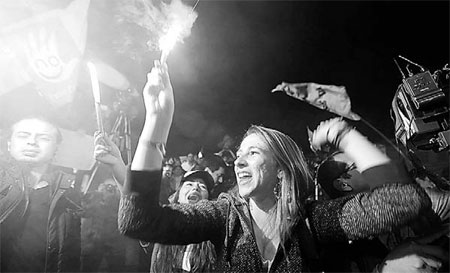Bogota's leftist mayor removed from office
The mayor of Colombia's capital Bogota was ousted from his post on Wednesday, President Juan Manuel Santos said, in a controversial decision that could affect May presidential elections and a peace process with left-wing rebels.
Gustavo Petro, 53, a former leftist guerrilla, was dismissed by the inspector general in December last year over alleged mismanagement but stayed pending a run of judicial appeals, the last of which ended on Tuesday and did not reverse the decision.
His dismissal and a 15-year ban from holding public office were viewed as too harsh, even among those who did not support Petro. The case has become a political hot potato amid perceptions the decision may have sought to undermine leftists.
The Inter-American Commission of Human Rights called late on Tuesday for Colombia's highest judicial authority to suspend its decision and allow Petro to serve the rest of his mandate.
But in a declaration naming Labor Minister Rafael Pardo Rueda interim mayor, Santos said that request was not legally binding and that Petro's appeal process had been exhaustive and his dismissal was now unavoidable.
"I have received official communication from the inspector general in which he solicits the dismissal by decree of the mayor of Bogota, Gustavo Petro Urrego, and I have to proceed in conformity with the constitution and the laws," Santos said.
Santos said the Council of State, the last entity to hear the judicial appeal, had informed Petro that he still had other mechanisms of judicial defense to which he could turn, without giving further detail.
Elections loom
Petro's dismissal was declared in December by right-wing prosecutor Alejandro Ordonez over the mayor's ill-fated attempt to reclaim the management of waste collection from private operators. Poor planning resulted in garbage amassing in the streets before the duties were returned to private contractors.
But trash quickly became a side issue as Colombians questioned whether the harsh sentence, especially the long ban from public office, was really intended to sideline the political left and bar a potential 2018 presidential candidate.
"(Santos' decision) shows that he is unable to bring peace to Colombia," Petro said in a speech from the balcony of the city hall, adding that the political establishment was unable to accept "diversity". He branded the decision "a political, electoral calculation".
Santos initiated peace talks with the main guerrilla group, the Revolutionary Armed Forces of Colombia, in November 2012, with the rebels' political participation one of the five points on the agenda on which partial agreement has been reached.
Center-right Santos will seek a second four-year term at elections on May 25, during which he hopes to complete the peace process aimed at ending a five-decade conflict that has killed around 220,000.
Surveys show Santos is the clear front-runner in the upcoming election and far ahead of Oscar Ivan Zuluaga, the chosen candidate of ex-president Alvaro Uribe. Uribe staunchly opposes peace negotiations and advocates continuing the policy of his 2002-10 term of defeating the guerrillas militarily.
Whether Santos dismissed or tried to maintain Petro in office, he was certain to draw the ire of politicians further to the left or right and the case could potentially cost him votes among some left-leaning voters.
|
Supporters of Bogota's ousted mayor Gustavo Petro protest against his dismissal in front of the mayoral building in the Colombian capital on Wednesday. John Vizcaino / Reuters |
(China Daily 03/21/2014 page11)















